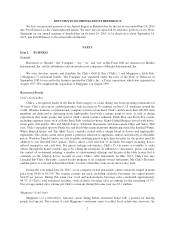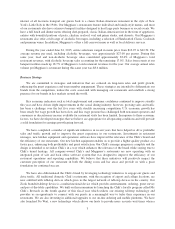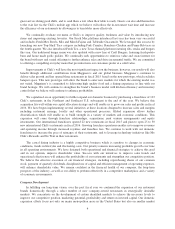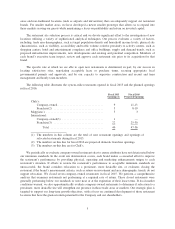Chili's 2015 Annual Report Download - page 18
Download and view the complete annual report
Please find page 18 of the 2015 Chili's annual report below. You can navigate through the pages in the report by either clicking on the pages listed below, or by using the keyword search tool below to find specific information within the annual report.Our profitability may be adversely affected by increases in energy costs.
Our success depends in part on our ability to absorb increases in utility costs, in particular, electricity and
natural gas. Various regions of the United States in which we operate multiple restaurants have experienced
volatility in utility prices. This has affected costs in the past and if they occur again, it would have possible
adverse effects on our profitability to the extent not otherwise recoverable through price increases or alternative
products, processes or cost reduction procedures. Further, higher prices for petroleum-based fuels may be passed
on to us by suppliers putting further pressure on margins as well as impact our guests discretionary funds and
ability to patron our restaurants or their menu choices.
Successful strategic transactions are important to our future growth and profitability.
We evaluate potential franchisees of new and existing restaurants and joint venture investments, as well as
mergers, acquisitions and divestitures, as part of our strategic planning initiative. These transactions involve
various inherent risks, including accurately assessing:
• the value, future growth potential, strengths, weaknesses, contingent and other liabilities and potential
profitability of franchise and joint venture partner candidates;
• our ability to achieve projected economic and operating synergies; and
• unanticipated changes in business and economic conditions affecting an acquired business or the
completion of a divestiture.
We acquired Pepper Dining Holding Corp., a franchisee with 103 Chili’s restaurants in the northeastern and
southeastern U.S. on June 25, 2015. These acquired restaurants have lower annual average sales volumes and
different margin structures than our company-owned Chili’s restaurants. We are integrating the acquired
restaurants into our Chili’s operations structure and are rolling out processes to improve sales and margins. We
are also reimaging these restaurants and leveraging technology investments in the restaurants. There is no
assurance that these initiatives will achieve the sales growth and margin improvements for which we have
planned, and would not adversely impact our profitability in the future if not met.
If we are unable to meet our business strategy plan, our profitability in the future may be adversely
affected.
Our ability to meet our business strategy plan is dependent upon, among other things, our and our
franchisees’ ability to:
• increase gross sales and operating profits at existing restaurants with food and beverage options and
high quality service desired by our guests through successful implementation of strategic initiatives;
• identify adequate sources of capital to fund and finance strategic initiatives, including reimaging of
existing restaurants, new restaurant development and new equipment;
• identify available, suitable and economically viable locations for new restaurants;
• obtain all required governmental permits (including zoning approvals and liquor licenses) on a timely
basis;
• hire all necessary contractors and subcontractors, obtain construction materials at suitable prices, and
maintain construction schedules; and
• hire and train or retain qualified managers and team members for existing and new restaurants.
The current slow economic growth could have a material adverse impact on our landlords or other tenants
in retail centers in which we or our franchisees are located, which in turn could negatively affect our
financial results.
If the slow economic growth continues or returns to prior recessionary levels, our landlords may be unable
to obtain financing or remain in good standing under their existing financing arrangements, resulting in failures
12
























